Leadership Concepts, Styles, and Self-Reflection Analysis Report
VerifiedAdded on 2022/09/25
|10
|2420
|22
Report
AI Summary
This report delves into the multifaceted world of leadership, exploring key concepts such as leadership styles (autocratic, democratic, and transformational), principles, theories (including Tuckman’s team development), and essential skills (decision-making, problem-solving, motivation, and communication). The author reflects on these concepts, identifying their own leadership style as participative management and outlining strategies for integrating these concepts to enhance their leadership abilities. The report emphasizes self-awareness and the importance of understanding the situational context and individual follower needs. It also includes references to academic literature, highlighting the importance of visionary leadership and its impact on organizational success.
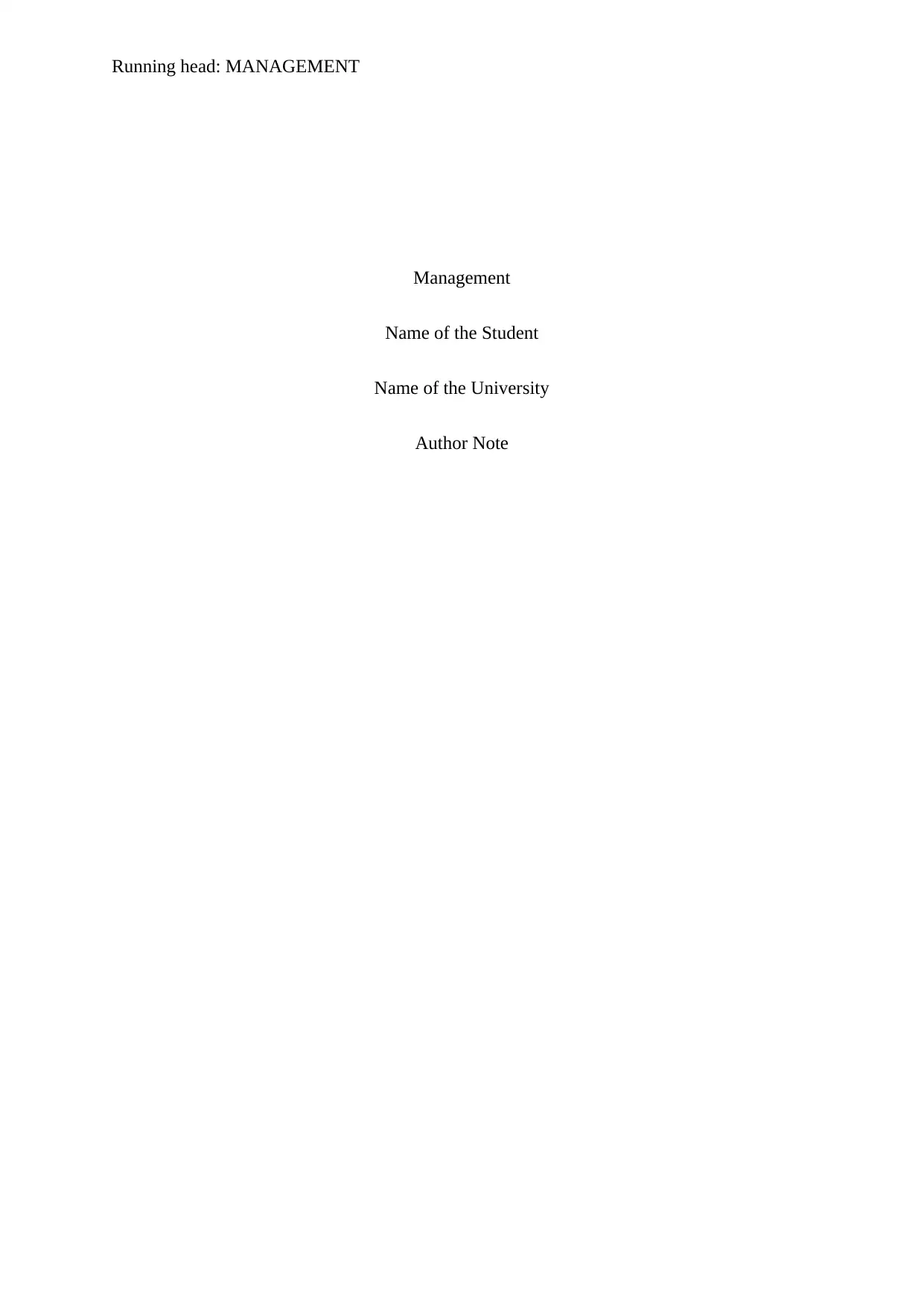
Running head: MANAGEMENT
Management
Name of the Student
Name of the University
Author Note
Management
Name of the Student
Name of the University
Author Note
Paraphrase This Document
Need a fresh take? Get an instant paraphrase of this document with our AI Paraphraser
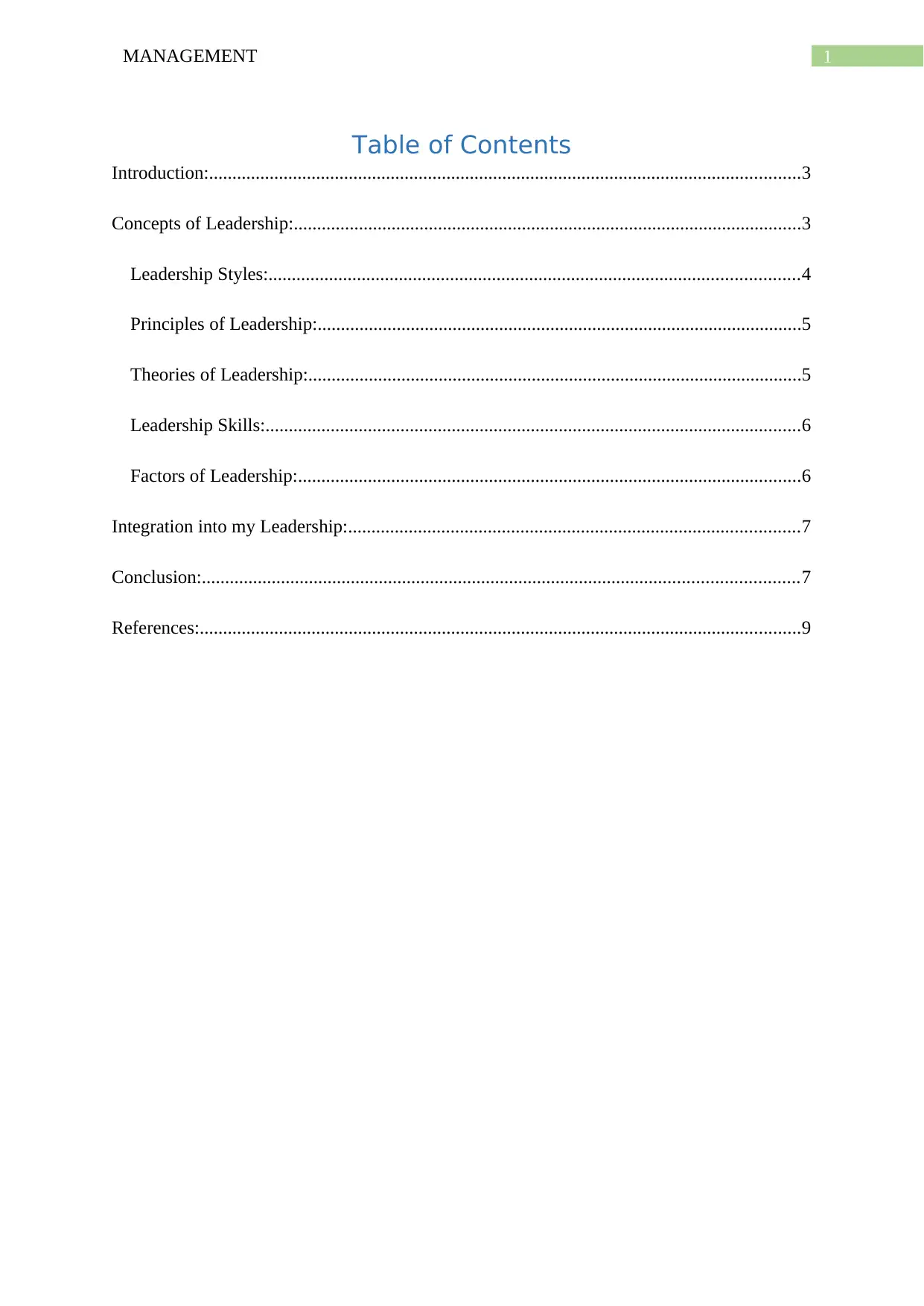
1MANAGEMENT
Table of Contents
Introduction:...............................................................................................................................3
Concepts of Leadership:.............................................................................................................3
Leadership Styles:..................................................................................................................4
Principles of Leadership:........................................................................................................5
Theories of Leadership:..........................................................................................................5
Leadership Skills:...................................................................................................................6
Factors of Leadership:............................................................................................................6
Integration into my Leadership:.................................................................................................7
Conclusion:................................................................................................................................7
References:.................................................................................................................................9
Table of Contents
Introduction:...............................................................................................................................3
Concepts of Leadership:.............................................................................................................3
Leadership Styles:..................................................................................................................4
Principles of Leadership:........................................................................................................5
Theories of Leadership:..........................................................................................................5
Leadership Skills:...................................................................................................................6
Factors of Leadership:............................................................................................................6
Integration into my Leadership:.................................................................................................7
Conclusion:................................................................................................................................7
References:.................................................................................................................................9
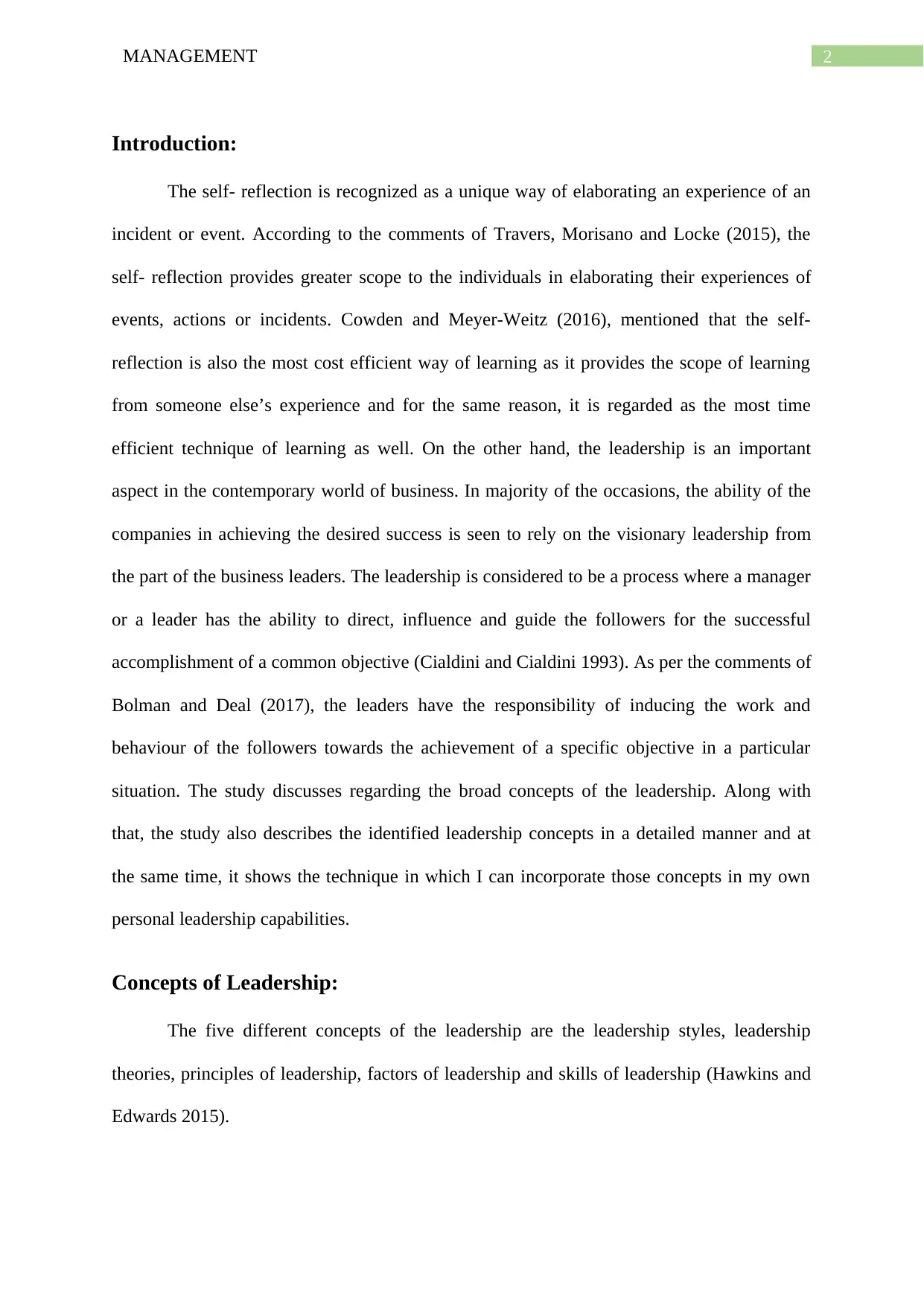
2MANAGEMENT
Introduction:
The self- reflection is recognized as a unique way of elaborating an experience of an
incident or event. According to the comments of Travers, Morisano and Locke (2015), the
self- reflection provides greater scope to the individuals in elaborating their experiences of
events, actions or incidents. Cowden and Meyer-Weitz (2016), mentioned that the self-
reflection is also the most cost efficient way of learning as it provides the scope of learning
from someone else’s experience and for the same reason, it is regarded as the most time
efficient technique of learning as well. On the other hand, the leadership is an important
aspect in the contemporary world of business. In majority of the occasions, the ability of the
companies in achieving the desired success is seen to rely on the visionary leadership from
the part of the business leaders. The leadership is considered to be a process where a manager
or a leader has the ability to direct, influence and guide the followers for the successful
accomplishment of a common objective (Cialdini and Cialdini 1993). As per the comments of
Bolman and Deal (2017), the leaders have the responsibility of inducing the work and
behaviour of the followers towards the achievement of a specific objective in a particular
situation. The study discusses regarding the broad concepts of the leadership. Along with
that, the study also describes the identified leadership concepts in a detailed manner and at
the same time, it shows the technique in which I can incorporate those concepts in my own
personal leadership capabilities.
Concepts of Leadership:
The five different concepts of the leadership are the leadership styles, leadership
theories, principles of leadership, factors of leadership and skills of leadership (Hawkins and
Edwards 2015).
Introduction:
The self- reflection is recognized as a unique way of elaborating an experience of an
incident or event. According to the comments of Travers, Morisano and Locke (2015), the
self- reflection provides greater scope to the individuals in elaborating their experiences of
events, actions or incidents. Cowden and Meyer-Weitz (2016), mentioned that the self-
reflection is also the most cost efficient way of learning as it provides the scope of learning
from someone else’s experience and for the same reason, it is regarded as the most time
efficient technique of learning as well. On the other hand, the leadership is an important
aspect in the contemporary world of business. In majority of the occasions, the ability of the
companies in achieving the desired success is seen to rely on the visionary leadership from
the part of the business leaders. The leadership is considered to be a process where a manager
or a leader has the ability to direct, influence and guide the followers for the successful
accomplishment of a common objective (Cialdini and Cialdini 1993). As per the comments of
Bolman and Deal (2017), the leaders have the responsibility of inducing the work and
behaviour of the followers towards the achievement of a specific objective in a particular
situation. The study discusses regarding the broad concepts of the leadership. Along with
that, the study also describes the identified leadership concepts in a detailed manner and at
the same time, it shows the technique in which I can incorporate those concepts in my own
personal leadership capabilities.
Concepts of Leadership:
The five different concepts of the leadership are the leadership styles, leadership
theories, principles of leadership, factors of leadership and skills of leadership (Hawkins and
Edwards 2015).
⊘ This is a preview!⊘
Do you want full access?
Subscribe today to unlock all pages.

Trusted by 1+ million students worldwide
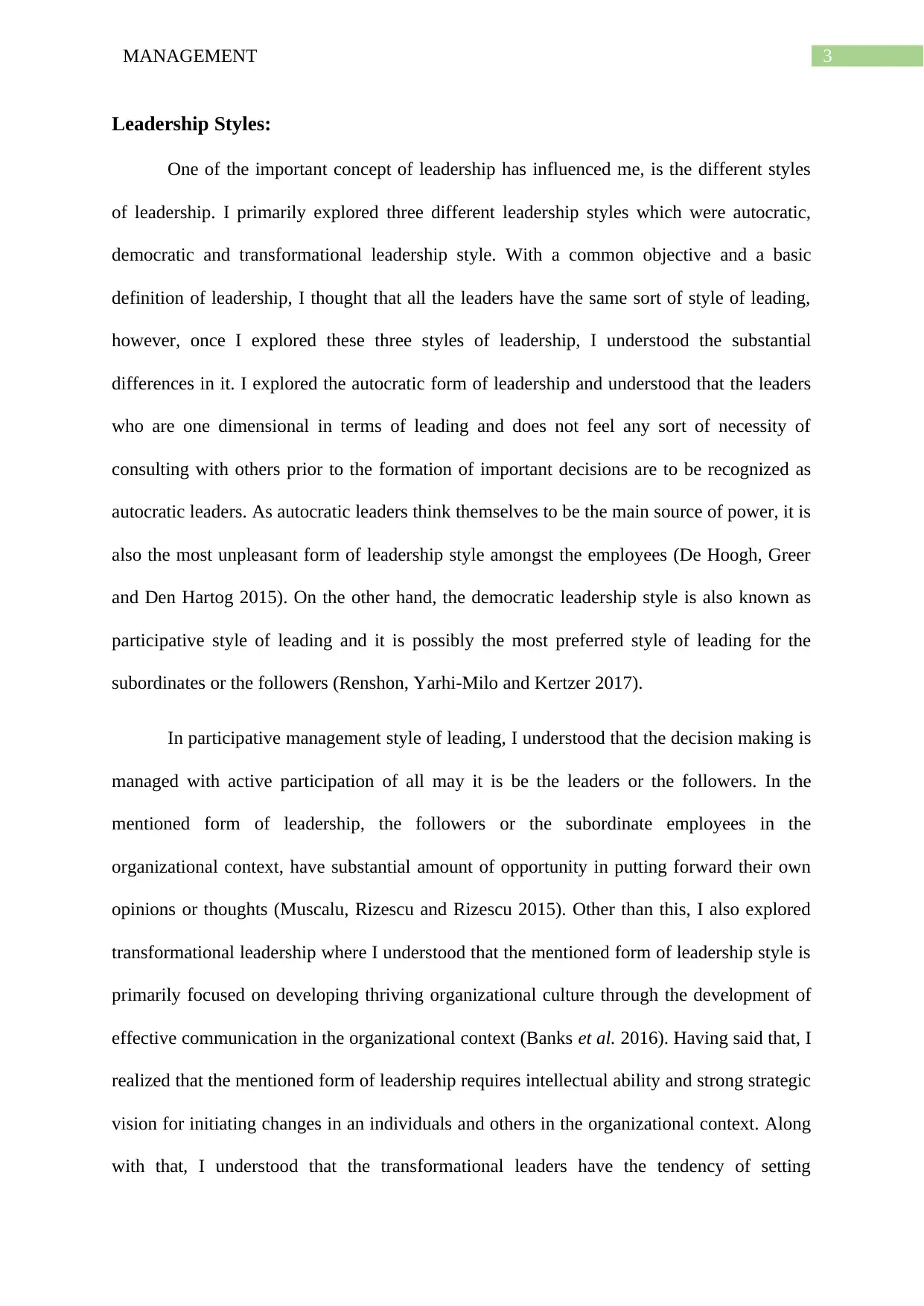
3MANAGEMENT
Leadership Styles:
One of the important concept of leadership has influenced me, is the different styles
of leadership. I primarily explored three different leadership styles which were autocratic,
democratic and transformational leadership style. With a common objective and a basic
definition of leadership, I thought that all the leaders have the same sort of style of leading,
however, once I explored these three styles of leadership, I understood the substantial
differences in it. I explored the autocratic form of leadership and understood that the leaders
who are one dimensional in terms of leading and does not feel any sort of necessity of
consulting with others prior to the formation of important decisions are to be recognized as
autocratic leaders. As autocratic leaders think themselves to be the main source of power, it is
also the most unpleasant form of leadership style amongst the employees (De Hoogh, Greer
and Den Hartog 2015). On the other hand, the democratic leadership style is also known as
participative style of leading and it is possibly the most preferred style of leading for the
subordinates or the followers (Renshon, Yarhi-Milo and Kertzer 2017).
In participative management style of leading, I understood that the decision making is
managed with active participation of all may it is be the leaders or the followers. In the
mentioned form of leadership, the followers or the subordinate employees in the
organizational context, have substantial amount of opportunity in putting forward their own
opinions or thoughts (Muscalu, Rizescu and Rizescu 2015). Other than this, I also explored
transformational leadership where I understood that the mentioned form of leadership style is
primarily focused on developing thriving organizational culture through the development of
effective communication in the organizational context (Banks et al. 2016). Having said that, I
realized that the mentioned form of leadership requires intellectual ability and strong strategic
vision for initiating changes in an individuals and others in the organizational context. Along
with that, I understood that the transformational leaders have the tendency of setting
Leadership Styles:
One of the important concept of leadership has influenced me, is the different styles
of leadership. I primarily explored three different leadership styles which were autocratic,
democratic and transformational leadership style. With a common objective and a basic
definition of leadership, I thought that all the leaders have the same sort of style of leading,
however, once I explored these three styles of leadership, I understood the substantial
differences in it. I explored the autocratic form of leadership and understood that the leaders
who are one dimensional in terms of leading and does not feel any sort of necessity of
consulting with others prior to the formation of important decisions are to be recognized as
autocratic leaders. As autocratic leaders think themselves to be the main source of power, it is
also the most unpleasant form of leadership style amongst the employees (De Hoogh, Greer
and Den Hartog 2015). On the other hand, the democratic leadership style is also known as
participative style of leading and it is possibly the most preferred style of leading for the
subordinates or the followers (Renshon, Yarhi-Milo and Kertzer 2017).
In participative management style of leading, I understood that the decision making is
managed with active participation of all may it is be the leaders or the followers. In the
mentioned form of leadership, the followers or the subordinate employees in the
organizational context, have substantial amount of opportunity in putting forward their own
opinions or thoughts (Muscalu, Rizescu and Rizescu 2015). Other than this, I also explored
transformational leadership where I understood that the mentioned form of leadership style is
primarily focused on developing thriving organizational culture through the development of
effective communication in the organizational context (Banks et al. 2016). Having said that, I
realized that the mentioned form of leadership requires intellectual ability and strong strategic
vision for initiating changes in an individuals and others in the organizational context. Along
with that, I understood that the transformational leaders have the tendency of setting
Paraphrase This Document
Need a fresh take? Get an instant paraphrase of this document with our AI Paraphraser
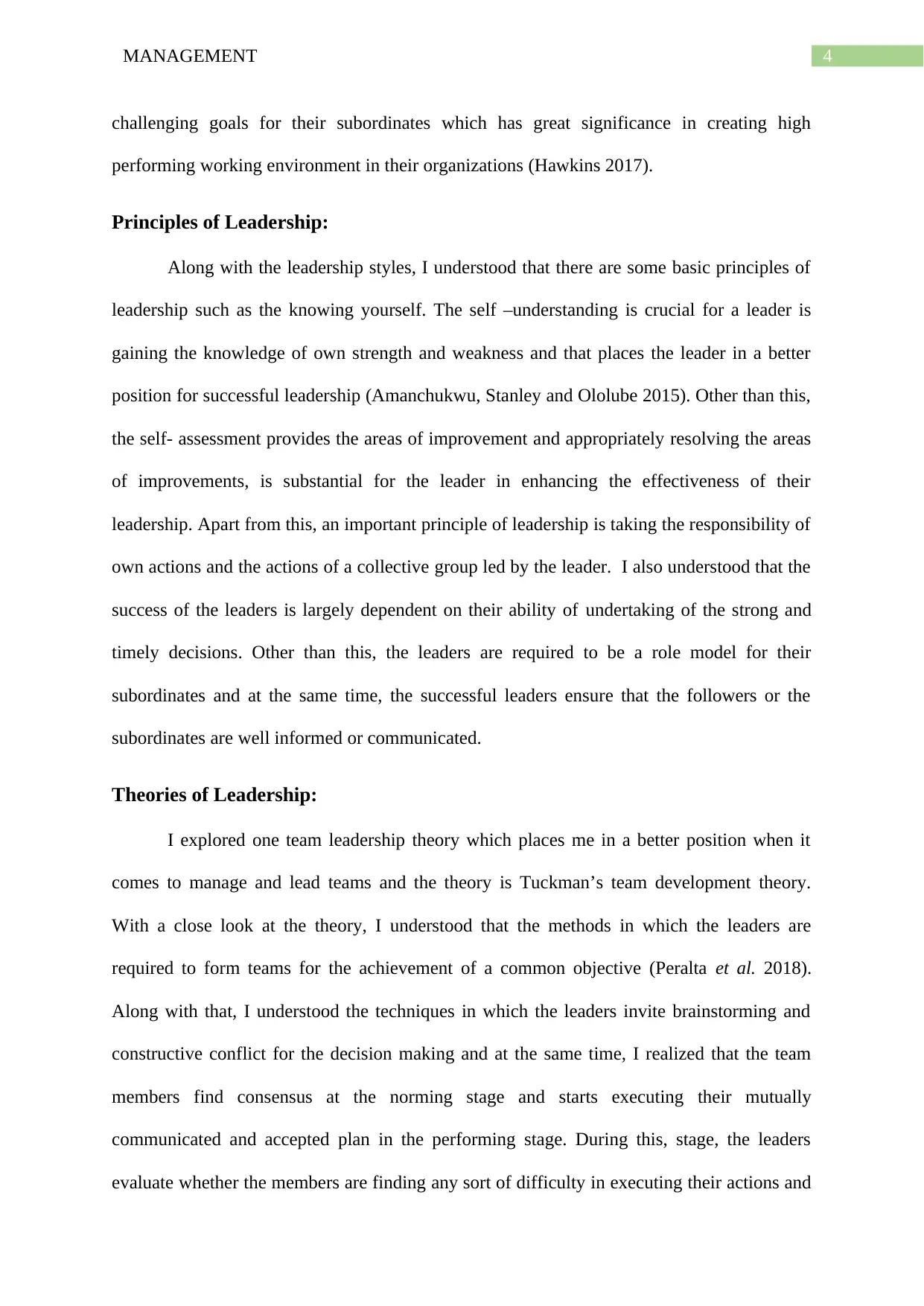
4MANAGEMENT
challenging goals for their subordinates which has great significance in creating high
performing working environment in their organizations (Hawkins 2017).
Principles of Leadership:
Along with the leadership styles, I understood that there are some basic principles of
leadership such as the knowing yourself. The self –understanding is crucial for a leader is
gaining the knowledge of own strength and weakness and that places the leader in a better
position for successful leadership (Amanchukwu, Stanley and Ololube 2015). Other than this,
the self- assessment provides the areas of improvement and appropriately resolving the areas
of improvements, is substantial for the leader in enhancing the effectiveness of their
leadership. Apart from this, an important principle of leadership is taking the responsibility of
own actions and the actions of a collective group led by the leader. I also understood that the
success of the leaders is largely dependent on their ability of undertaking of the strong and
timely decisions. Other than this, the leaders are required to be a role model for their
subordinates and at the same time, the successful leaders ensure that the followers or the
subordinates are well informed or communicated.
Theories of Leadership:
I explored one team leadership theory which places me in a better position when it
comes to manage and lead teams and the theory is Tuckman’s team development theory.
With a close look at the theory, I understood that the methods in which the leaders are
required to form teams for the achievement of a common objective (Peralta et al. 2018).
Along with that, I understood the techniques in which the leaders invite brainstorming and
constructive conflict for the decision making and at the same time, I realized that the team
members find consensus at the norming stage and starts executing their mutually
communicated and accepted plan in the performing stage. During this, stage, the leaders
evaluate whether the members are finding any sort of difficulty in executing their actions and
challenging goals for their subordinates which has great significance in creating high
performing working environment in their organizations (Hawkins 2017).
Principles of Leadership:
Along with the leadership styles, I understood that there are some basic principles of
leadership such as the knowing yourself. The self –understanding is crucial for a leader is
gaining the knowledge of own strength and weakness and that places the leader in a better
position for successful leadership (Amanchukwu, Stanley and Ololube 2015). Other than this,
the self- assessment provides the areas of improvement and appropriately resolving the areas
of improvements, is substantial for the leader in enhancing the effectiveness of their
leadership. Apart from this, an important principle of leadership is taking the responsibility of
own actions and the actions of a collective group led by the leader. I also understood that the
success of the leaders is largely dependent on their ability of undertaking of the strong and
timely decisions. Other than this, the leaders are required to be a role model for their
subordinates and at the same time, the successful leaders ensure that the followers or the
subordinates are well informed or communicated.
Theories of Leadership:
I explored one team leadership theory which places me in a better position when it
comes to manage and lead teams and the theory is Tuckman’s team development theory.
With a close look at the theory, I understood that the methods in which the leaders are
required to form teams for the achievement of a common objective (Peralta et al. 2018).
Along with that, I understood the techniques in which the leaders invite brainstorming and
constructive conflict for the decision making and at the same time, I realized that the team
members find consensus at the norming stage and starts executing their mutually
communicated and accepted plan in the performing stage. During this, stage, the leaders
evaluate whether the members are finding any sort of difficulty in executing their actions and
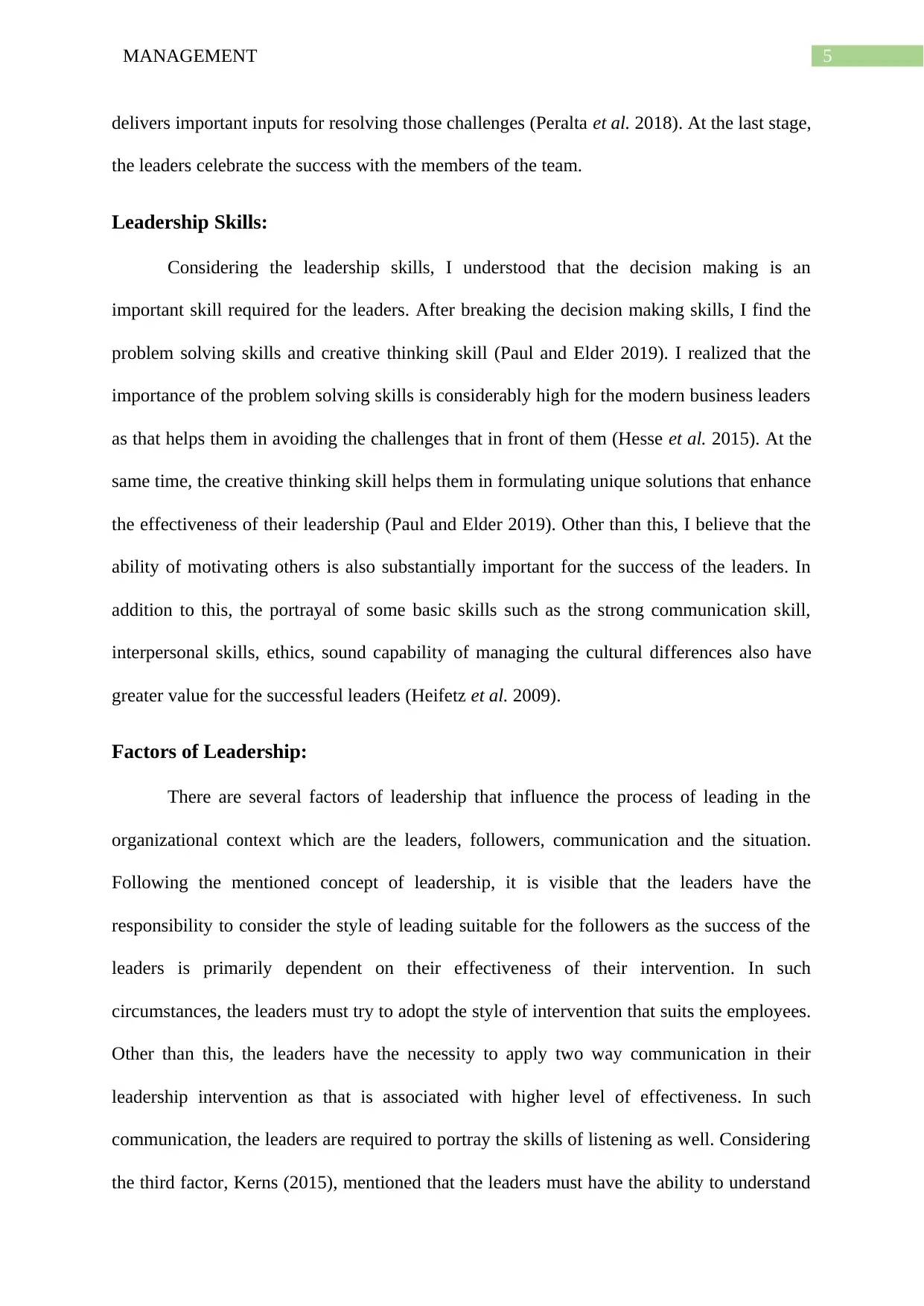
5MANAGEMENT
delivers important inputs for resolving those challenges (Peralta et al. 2018). At the last stage,
the leaders celebrate the success with the members of the team.
Leadership Skills:
Considering the leadership skills, I understood that the decision making is an
important skill required for the leaders. After breaking the decision making skills, I find the
problem solving skills and creative thinking skill (Paul and Elder 2019). I realized that the
importance of the problem solving skills is considerably high for the modern business leaders
as that helps them in avoiding the challenges that in front of them (Hesse et al. 2015). At the
same time, the creative thinking skill helps them in formulating unique solutions that enhance
the effectiveness of their leadership (Paul and Elder 2019). Other than this, I believe that the
ability of motivating others is also substantially important for the success of the leaders. In
addition to this, the portrayal of some basic skills such as the strong communication skill,
interpersonal skills, ethics, sound capability of managing the cultural differences also have
greater value for the successful leaders (Heifetz et al. 2009).
Factors of Leadership:
There are several factors of leadership that influence the process of leading in the
organizational context which are the leaders, followers, communication and the situation.
Following the mentioned concept of leadership, it is visible that the leaders have the
responsibility to consider the style of leading suitable for the followers as the success of the
leaders is primarily dependent on their effectiveness of their intervention. In such
circumstances, the leaders must try to adopt the style of intervention that suits the employees.
Other than this, the leaders have the necessity to apply two way communication in their
leadership intervention as that is associated with higher level of effectiveness. In such
communication, the leaders are required to portray the skills of listening as well. Considering
the third factor, Kerns (2015), mentioned that the leaders must have the ability to understand
delivers important inputs for resolving those challenges (Peralta et al. 2018). At the last stage,
the leaders celebrate the success with the members of the team.
Leadership Skills:
Considering the leadership skills, I understood that the decision making is an
important skill required for the leaders. After breaking the decision making skills, I find the
problem solving skills and creative thinking skill (Paul and Elder 2019). I realized that the
importance of the problem solving skills is considerably high for the modern business leaders
as that helps them in avoiding the challenges that in front of them (Hesse et al. 2015). At the
same time, the creative thinking skill helps them in formulating unique solutions that enhance
the effectiveness of their leadership (Paul and Elder 2019). Other than this, I believe that the
ability of motivating others is also substantially important for the success of the leaders. In
addition to this, the portrayal of some basic skills such as the strong communication skill,
interpersonal skills, ethics, sound capability of managing the cultural differences also have
greater value for the successful leaders (Heifetz et al. 2009).
Factors of Leadership:
There are several factors of leadership that influence the process of leading in the
organizational context which are the leaders, followers, communication and the situation.
Following the mentioned concept of leadership, it is visible that the leaders have the
responsibility to consider the style of leading suitable for the followers as the success of the
leaders is primarily dependent on their effectiveness of their intervention. In such
circumstances, the leaders must try to adopt the style of intervention that suits the employees.
Other than this, the leaders have the necessity to apply two way communication in their
leadership intervention as that is associated with higher level of effectiveness. In such
communication, the leaders are required to portray the skills of listening as well. Considering
the third factor, Kerns (2015), mentioned that the leaders must have the ability to understand
⊘ This is a preview!⊘
Do you want full access?
Subscribe today to unlock all pages.

Trusted by 1+ million students worldwide
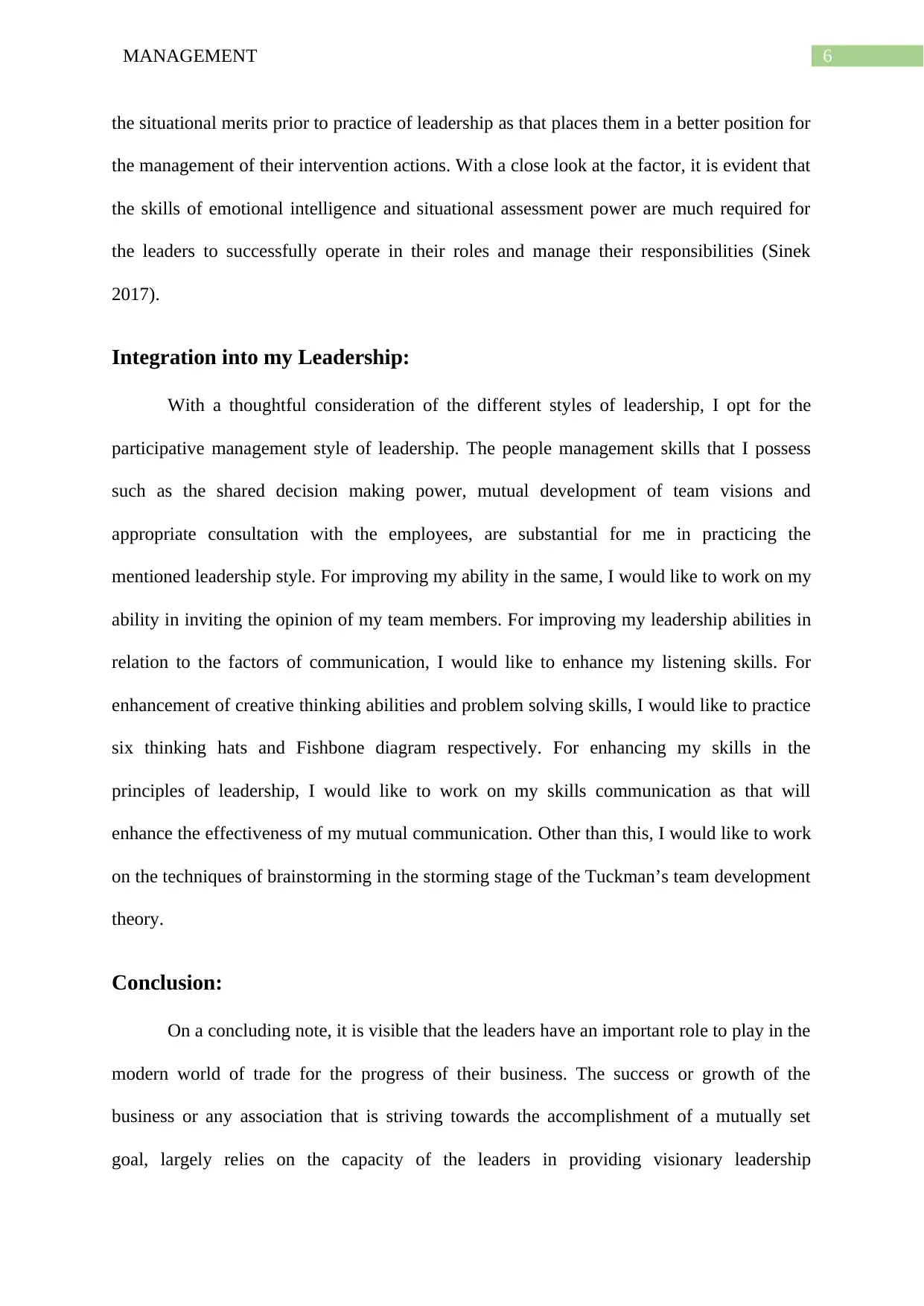
6MANAGEMENT
the situational merits prior to practice of leadership as that places them in a better position for
the management of their intervention actions. With a close look at the factor, it is evident that
the skills of emotional intelligence and situational assessment power are much required for
the leaders to successfully operate in their roles and manage their responsibilities (Sinek
2017).
Integration into my Leadership:
With a thoughtful consideration of the different styles of leadership, I opt for the
participative management style of leadership. The people management skills that I possess
such as the shared decision making power, mutual development of team visions and
appropriate consultation with the employees, are substantial for me in practicing the
mentioned leadership style. For improving my ability in the same, I would like to work on my
ability in inviting the opinion of my team members. For improving my leadership abilities in
relation to the factors of communication, I would like to enhance my listening skills. For
enhancement of creative thinking abilities and problem solving skills, I would like to practice
six thinking hats and Fishbone diagram respectively. For enhancing my skills in the
principles of leadership, I would like to work on my skills communication as that will
enhance the effectiveness of my mutual communication. Other than this, I would like to work
on the techniques of brainstorming in the storming stage of the Tuckman’s team development
theory.
Conclusion:
On a concluding note, it is visible that the leaders have an important role to play in the
modern world of trade for the progress of their business. The success or growth of the
business or any association that is striving towards the accomplishment of a mutually set
goal, largely relies on the capacity of the leaders in providing visionary leadership
the situational merits prior to practice of leadership as that places them in a better position for
the management of their intervention actions. With a close look at the factor, it is evident that
the skills of emotional intelligence and situational assessment power are much required for
the leaders to successfully operate in their roles and manage their responsibilities (Sinek
2017).
Integration into my Leadership:
With a thoughtful consideration of the different styles of leadership, I opt for the
participative management style of leadership. The people management skills that I possess
such as the shared decision making power, mutual development of team visions and
appropriate consultation with the employees, are substantial for me in practicing the
mentioned leadership style. For improving my ability in the same, I would like to work on my
ability in inviting the opinion of my team members. For improving my leadership abilities in
relation to the factors of communication, I would like to enhance my listening skills. For
enhancement of creative thinking abilities and problem solving skills, I would like to practice
six thinking hats and Fishbone diagram respectively. For enhancing my skills in the
principles of leadership, I would like to work on my skills communication as that will
enhance the effectiveness of my mutual communication. Other than this, I would like to work
on the techniques of brainstorming in the storming stage of the Tuckman’s team development
theory.
Conclusion:
On a concluding note, it is visible that the leaders have an important role to play in the
modern world of trade for the progress of their business. The success or growth of the
business or any association that is striving towards the accomplishment of a mutually set
goal, largely relies on the capacity of the leaders in providing visionary leadership
Paraphrase This Document
Need a fresh take? Get an instant paraphrase of this document with our AI Paraphraser
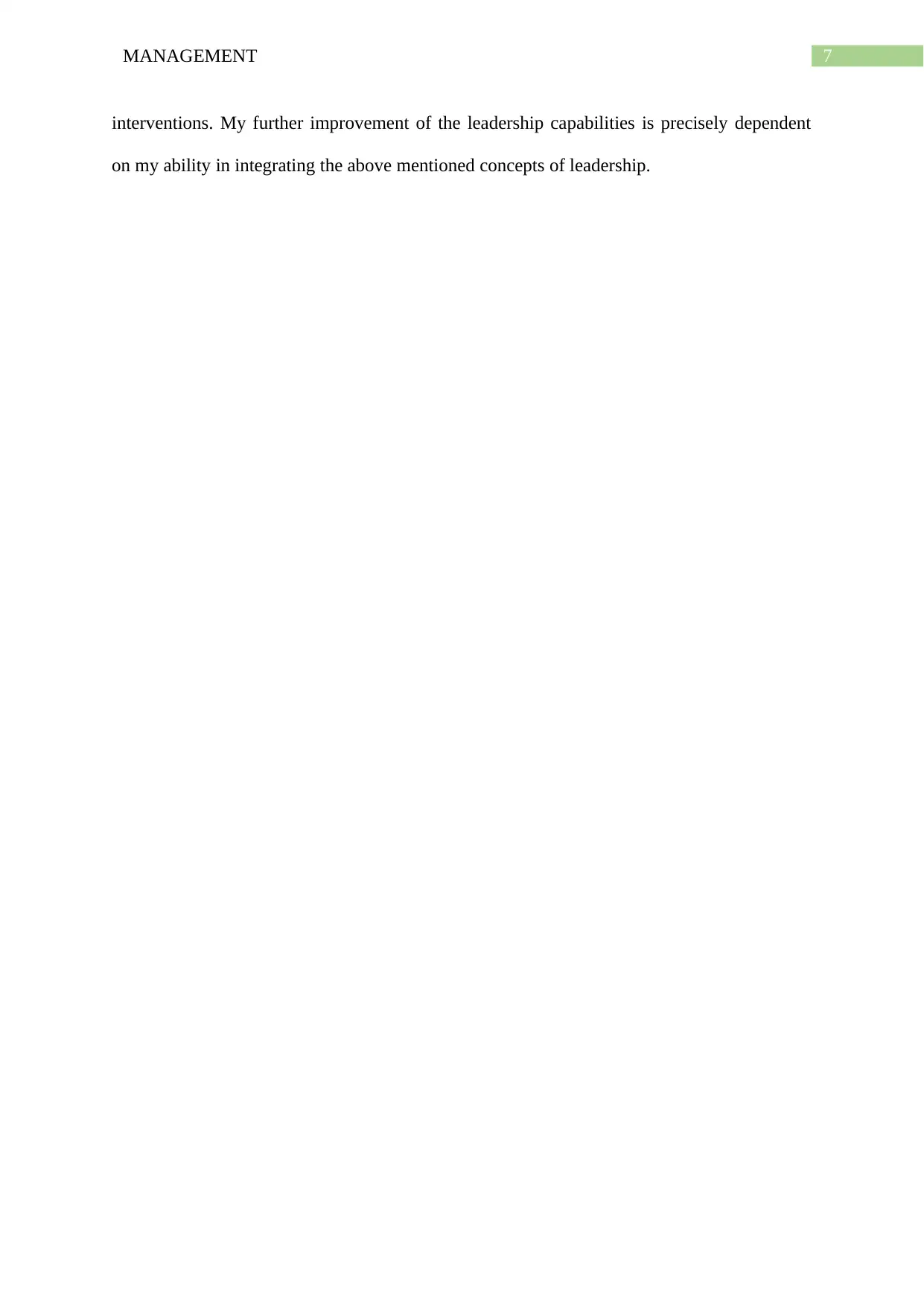
7MANAGEMENT
interventions. My further improvement of the leadership capabilities is precisely dependent
on my ability in integrating the above mentioned concepts of leadership.
interventions. My further improvement of the leadership capabilities is precisely dependent
on my ability in integrating the above mentioned concepts of leadership.
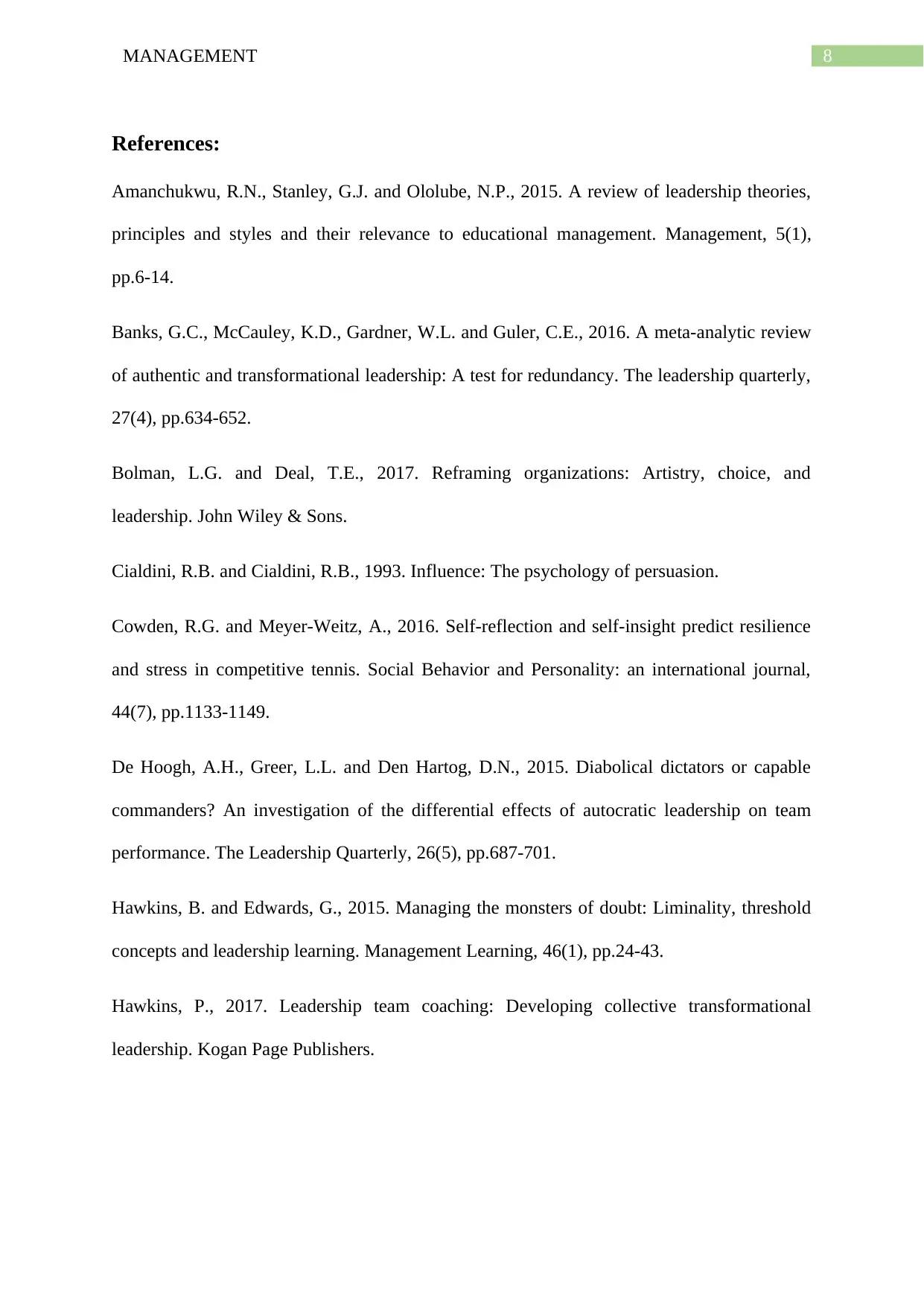
8MANAGEMENT
References:
Amanchukwu, R.N., Stanley, G.J. and Ololube, N.P., 2015. A review of leadership theories,
principles and styles and their relevance to educational management. Management, 5(1),
pp.6-14.
Banks, G.C., McCauley, K.D., Gardner, W.L. and Guler, C.E., 2016. A meta-analytic review
of authentic and transformational leadership: A test for redundancy. The leadership quarterly,
27(4), pp.634-652.
Bolman, L.G. and Deal, T.E., 2017. Reframing organizations: Artistry, choice, and
leadership. John Wiley & Sons.
Cialdini, R.B. and Cialdini, R.B., 1993. Influence: The psychology of persuasion.
Cowden, R.G. and Meyer-Weitz, A., 2016. Self-reflection and self-insight predict resilience
and stress in competitive tennis. Social Behavior and Personality: an international journal,
44(7), pp.1133-1149.
De Hoogh, A.H., Greer, L.L. and Den Hartog, D.N., 2015. Diabolical dictators or capable
commanders? An investigation of the differential effects of autocratic leadership on team
performance. The Leadership Quarterly, 26(5), pp.687-701.
Hawkins, B. and Edwards, G., 2015. Managing the monsters of doubt: Liminality, threshold
concepts and leadership learning. Management Learning, 46(1), pp.24-43.
Hawkins, P., 2017. Leadership team coaching: Developing collective transformational
leadership. Kogan Page Publishers.
References:
Amanchukwu, R.N., Stanley, G.J. and Ololube, N.P., 2015. A review of leadership theories,
principles and styles and their relevance to educational management. Management, 5(1),
pp.6-14.
Banks, G.C., McCauley, K.D., Gardner, W.L. and Guler, C.E., 2016. A meta-analytic review
of authentic and transformational leadership: A test for redundancy. The leadership quarterly,
27(4), pp.634-652.
Bolman, L.G. and Deal, T.E., 2017. Reframing organizations: Artistry, choice, and
leadership. John Wiley & Sons.
Cialdini, R.B. and Cialdini, R.B., 1993. Influence: The psychology of persuasion.
Cowden, R.G. and Meyer-Weitz, A., 2016. Self-reflection and self-insight predict resilience
and stress in competitive tennis. Social Behavior and Personality: an international journal,
44(7), pp.1133-1149.
De Hoogh, A.H., Greer, L.L. and Den Hartog, D.N., 2015. Diabolical dictators or capable
commanders? An investigation of the differential effects of autocratic leadership on team
performance. The Leadership Quarterly, 26(5), pp.687-701.
Hawkins, B. and Edwards, G., 2015. Managing the monsters of doubt: Liminality, threshold
concepts and leadership learning. Management Learning, 46(1), pp.24-43.
Hawkins, P., 2017. Leadership team coaching: Developing collective transformational
leadership. Kogan Page Publishers.
⊘ This is a preview!⊘
Do you want full access?
Subscribe today to unlock all pages.

Trusted by 1+ million students worldwide
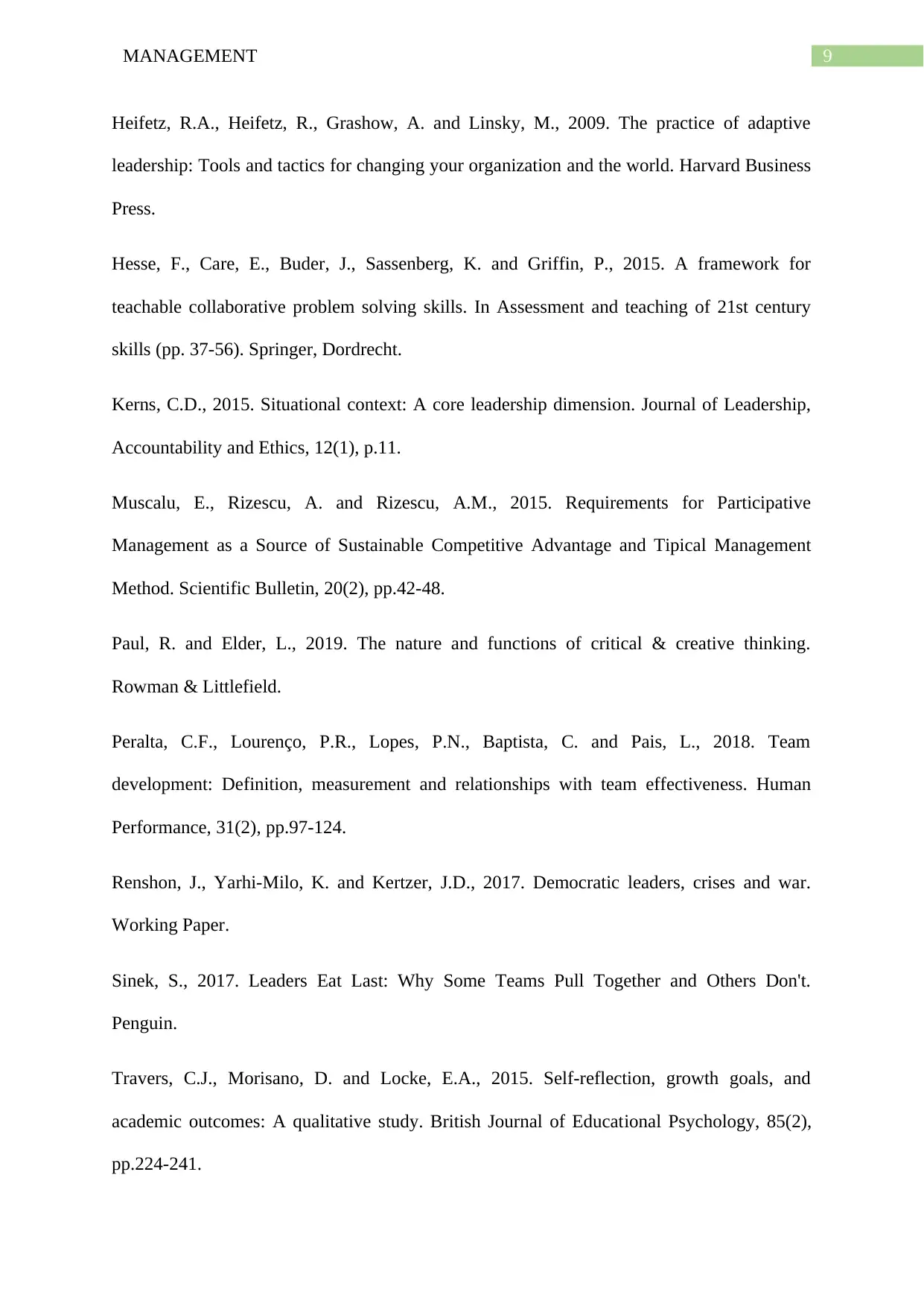
9MANAGEMENT
Heifetz, R.A., Heifetz, R., Grashow, A. and Linsky, M., 2009. The practice of adaptive
leadership: Tools and tactics for changing your organization and the world. Harvard Business
Press.
Hesse, F., Care, E., Buder, J., Sassenberg, K. and Griffin, P., 2015. A framework for
teachable collaborative problem solving skills. In Assessment and teaching of 21st century
skills (pp. 37-56). Springer, Dordrecht.
Kerns, C.D., 2015. Situational context: A core leadership dimension. Journal of Leadership,
Accountability and Ethics, 12(1), p.11.
Muscalu, E., Rizescu, A. and Rizescu, A.M., 2015. Requirements for Participative
Management as a Source of Sustainable Competitive Advantage and Tipical Management
Method. Scientific Bulletin, 20(2), pp.42-48.
Paul, R. and Elder, L., 2019. The nature and functions of critical & creative thinking.
Rowman & Littlefield.
Peralta, C.F., Lourenço, P.R., Lopes, P.N., Baptista, C. and Pais, L., 2018. Team
development: Definition, measurement and relationships with team effectiveness. Human
Performance, 31(2), pp.97-124.
Renshon, J., Yarhi-Milo, K. and Kertzer, J.D., 2017. Democratic leaders, crises and war.
Working Paper.
Sinek, S., 2017. Leaders Eat Last: Why Some Teams Pull Together and Others Don't.
Penguin.
Travers, C.J., Morisano, D. and Locke, E.A., 2015. Self‐reflection, growth goals, and
academic outcomes: A qualitative study. British Journal of Educational Psychology, 85(2),
pp.224-241.
Heifetz, R.A., Heifetz, R., Grashow, A. and Linsky, M., 2009. The practice of adaptive
leadership: Tools and tactics for changing your organization and the world. Harvard Business
Press.
Hesse, F., Care, E., Buder, J., Sassenberg, K. and Griffin, P., 2015. A framework for
teachable collaborative problem solving skills. In Assessment and teaching of 21st century
skills (pp. 37-56). Springer, Dordrecht.
Kerns, C.D., 2015. Situational context: A core leadership dimension. Journal of Leadership,
Accountability and Ethics, 12(1), p.11.
Muscalu, E., Rizescu, A. and Rizescu, A.M., 2015. Requirements for Participative
Management as a Source of Sustainable Competitive Advantage and Tipical Management
Method. Scientific Bulletin, 20(2), pp.42-48.
Paul, R. and Elder, L., 2019. The nature and functions of critical & creative thinking.
Rowman & Littlefield.
Peralta, C.F., Lourenço, P.R., Lopes, P.N., Baptista, C. and Pais, L., 2018. Team
development: Definition, measurement and relationships with team effectiveness. Human
Performance, 31(2), pp.97-124.
Renshon, J., Yarhi-Milo, K. and Kertzer, J.D., 2017. Democratic leaders, crises and war.
Working Paper.
Sinek, S., 2017. Leaders Eat Last: Why Some Teams Pull Together and Others Don't.
Penguin.
Travers, C.J., Morisano, D. and Locke, E.A., 2015. Self‐reflection, growth goals, and
academic outcomes: A qualitative study. British Journal of Educational Psychology, 85(2),
pp.224-241.
1 out of 10
Related Documents
Your All-in-One AI-Powered Toolkit for Academic Success.
+13062052269
info@desklib.com
Available 24*7 on WhatsApp / Email
![[object Object]](/_next/static/media/star-bottom.7253800d.svg)
Unlock your academic potential
Copyright © 2020–2026 A2Z Services. All Rights Reserved. Developed and managed by ZUCOL.



